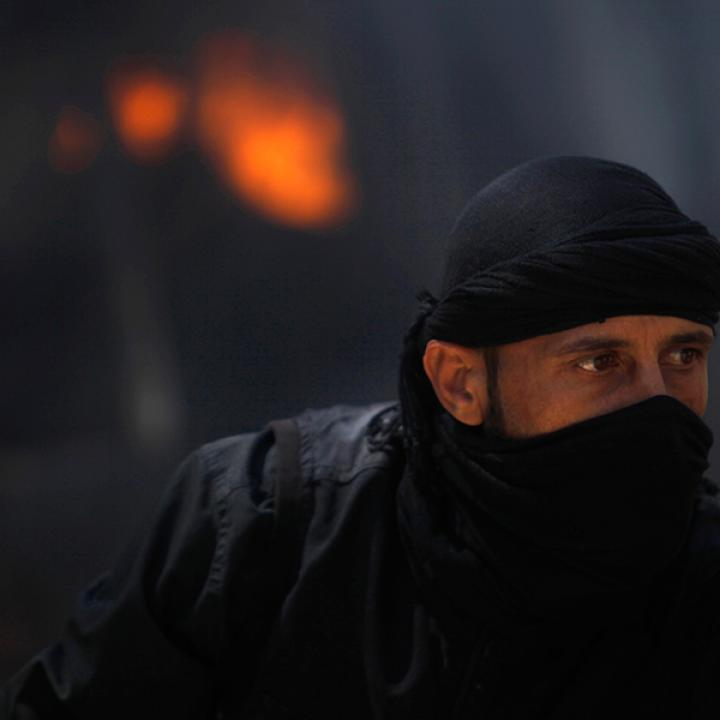
- Policy Analysis
- Articles & Op-Eds
The Flow of Islamist Fighters From Egypt to Syria, and the Sisi Government's Crackdown

Recent reports and interviews highlight the various factors that may have driven hundreds of Muslim Brothers to Syria -- and the problems they face in returning home.
After Egypt's first elected president, Muslim Brotherhood leader Mohamed Morsi, was overthrown in July 2013, many analysts (myself included) feared that the new government's crackdown on Islamists could spark a domestic insurgency. This disaster scenario hasn't come to pass. Egyptian security forces captured many Brotherhood-aligned youths responsible for low-profile attacks on state infrastructure. Meanwhile, the Brotherhood's call in January 2015 for "a long, uncompromising jihad" stoked tensions within the organization, dividing and weakening it. "We don't hear much about them now," a general told me last November. "They create some problems," he said of the Brotherhood, "but they see no result from what they are doing."
The Brotherhood's relative quiet in Egypt, however, might reflect some Muslim Brothers' decision to turn their attention elsewhere -- and only for the time being. A long, detailed report this month on the Arabic news site Ida'at suggested that some Egyptian Muslim Brothers and their allies have gone to fight in Syria, hoping to gain battlefield experience so they can return to Egypt for a "jihad against the tyrant," a reference to President Abdel Fattah al-Sisi. The report, which relies heavily on anonymous sources who were assigned pseudonyms, estimates that 600 to 700 Egyptians -- not all members of the Muslim Brotherhood -- joined the al-Qaeda affiliate that until recently was known as Jabhat al-Nusra, and that some 2000 Egyptians joined the Islamic State.
Many of the report's details cannot be independently verified, but the migration of Brotherhood-aligned youths to the Syrian conflict would not be surprising. Some aligned with the Brotherhood urged their followers to support Syrian jihadists even before Mr. Morsi was ousted. In May 2013, for example, Qatar-based cleric Yusuf al-Qaradawi -- a major Brotherhood ideological influence -- called on Sunnis to join the fight in Syria. The next month, then-President Morsi's office announced that Egyptians returning from the fight in Syria would not be prosecuted, and Mr. Morsi later keynoted a rally at Cairo Stadium at which radical clerics endorsed the Syrian jihad.
The Ida'at report indicates that the number of Egyptians fighting in Syria doubled after Mr. Morsi was overthrown and cites three factors related to the Egyptian government's crackdown on Islamists. First, the brutality of the post-Morsi period, during which hundreds of Morsi supporters have been killed and thousands jailed, convinced many Brotherhood youths that violence was their only option. Second, the disruption of the Brotherhood's notoriously hierarchical chain of command undermined the organization's "old guard" leaders, who had argued that violence was self-defeating. (A recent report in the Egyptian daily al-Shorouk suggests that the government is trying to reverse this trend by allowing these older figures to meet with Muslim Brothers in various provinces and reestablish control over the organization.) Third, many Brotherhood youths spent time in prison, where jihadists indoctrinated them.
The report also suggests that the path from Egypt to Syria and back is treacherous. Though hundreds of Egyptians have reportedly joined the Syrian jihad via Sudan and Turkey, smuggling people into Syria has become more difficult. Many Egyptians are thought to be on waiting lists. "Many of the reception offices have been closed completely, so [fewer] people are passing through the 'safe houses' in Turkey," the reporters quote a smuggler as saying.
In other words, the Egyptian government's crackdown contributed to the Brotherhood's radicalization, but it is also deterring many Egyptians fighting in Syria from returning home. "I've talked to many of the fighters entering Syria and they want to return, but where would they return?" another smuggler tells the Ida'at reporters. "The situation in Egypt doesn't permit taking up arms...and those that returned to work in Egypt ended up getting captured." This is why the Egyptian government is unlikely to end its crackdown on the Brotherhood and other Islamist groups anytime soon. It is also why the Sisi government tends to regard Washington's calls for political reform as undermining its domestic security.
Eric Trager is the Esther K. Wagner Fellow at The Washington Institute and author of the forthcoming book Arab Fall: How the Muslim Brotherhood Won and Lost Egypt in 891 Days. This article originally appeared on the Wall Street Journal blog "Think Tank."
Wall Street Journal


